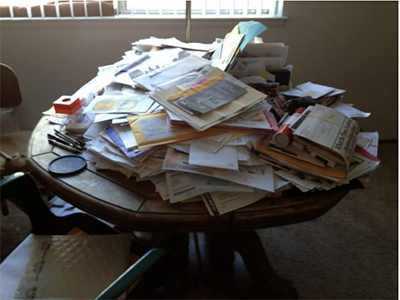Paperwork is my Nemesis

These are the words a client recently declared to me and I told her “You’re not alone. Papers are everyone’s nemesis. No one likes dealing with paper.” If there isn’t a good system in place, paper piles up quickly and becomes overwhelming.
I think there are a couple of issues that, when addressed, can make dealing with paper a lot easier. So I’m sharing those here, along with my paper management strategy, and hope it can help some of you struggling with papers.
The first issue I’ve noticed is that people don’t tend to sort paper when it comes in the home. It just gets dropped in an undifferentiated, ever-growing pile, and then that pile becomes unmanageable.
|
 |

Photo by Judith Bell, used under Creative Commons License
|
 |
 |
Papers represent a variety of different actions and timing, so sorting them immediately can change an overwhelming pile into chunks that can be managed systematically, and can reduce the volume of paper you’re dealing with at any given time.
The second issue is that there are a lot of papers that need to be dealt with at some point, but not necessarily right away. The traditional system of an inbox (for things to do), and a file cabinet (for things to be stored for future reference) doesn’t accommodate these “in process” papers (like clothes that sit out on the ubiquitous clothes chair because they are in transition). Setting up a place for these papers, that’s separate from the inbox and file cabinet, can help process papers effectively.
Here’s a general paper management schema that incorporates real-time sorting and “in-process” papers. I’ve adapted it for my clients and hope you find it helpful!
STEP 1: Get rid of excess paper when it first comes into your home. When you bring your mail in, take it to a place close to a recycle bin and immediately discard unnecessary items. Recycle the envelopes of anything you’re keeping (my friend calls this process “deboning”). Boom, half your paper is gone already.
STEP 2: Sort paper into a few meaningful categories. Either right away, or on at least a weekly basis, sort papers you’ve kept into bins representing different actions. The bins I most often recommend are:
- Do Now — for papers to address soon, such as bills
- Do Later — for papers that need to be dealt with at some point, such as medical
- File — papers you’d like to keep for your records (remember that with online options you may need to keep far fewer papers than you used to!)
- Shred — for those who need it
Here are some recommendations for bin and filing options:
Bins can be stacked or laid out in a row, it just depends on where you do paperwork. I recommend open and deep bins for greater visibility; if the bins are too narrow and stacked it feels like papers get lost.
For files, you can go with a short file cabinet, but I find that, with most documentation online these days, an accordion folder or two might accommodate all the physical papers you want to keep... and they take up so much less room! I also recommend that people purchase a small folder for important documents such as passports, birth certificates, cash, foreign currency, vaccine cards, etc.
STEP 3: Set up a paper addressing routine. Setting up a regular time to do paperwork, with an electronic reminder or calendar block of time, will help you get this process done more reliably, and with less stress and cognitive burden. Here’s what I recommend to clients:
- Weekly: handle the “Do Now” papers. If you’re feeling ambitious, knock out an item or two from the “Do Later” bin.
- Every 2-4 weeks: handle the “Do Later” papers.
- File when that bin is full. It’s so much more efficient that way, and there are a couple of additional benefits. BONUS #1: Having these papers sit around for a bit can be really helpful as you may need to reference them soon, and they’re not filed away yet! BONUS #2: By the time you get to filing papers, you may decide you no longer need to keep some of them — thus, less paper!
I don’t think this paper system will make you love dealing with papers, but it can help you avoid that overwhelming pile!
Reprinted with permission by Valerie of Pivot Organizing
|

